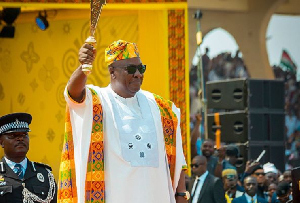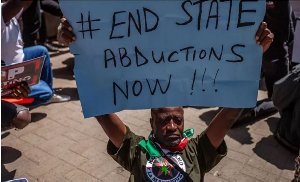The 2006 Report on Human Rights Practices released by the United States Bureau of Democracy, Human Rights and Labour has indicated that although the Government of Ghana generally respects human rights and has made significant improvements during the year, there are still problems including incidents of vigilante justice.
"Human rights problems included deaths resulting from the excessive use of force by police, vigilante justice, harsh and life-threatening prison conditions, police corruption and impunity, arbitrary arrest and detention, prolonged pre-trial detention, infringement on citizens’ privacy rights, forcible dispersal of demonstrations, forced evictions and corruption in all branches of government" are some problems cited by the report which was released on March 6, 2007.
The report, which is annually released by the bureau, also mentioned violence against women and children; female genital mutilation (FGM), societal discrimination against women, persons with disabilities, homosexuals, and persons with HIV/AIDS, trafficking in women and children; ethnic discrimination and politically and ethnically motivated violence; and child labor, including forced child labour.
During the year, the report said the government took significant steps to improve the protection of human rights, including passage of separate pieces of legislation to protect the rights of whistleblowers and persons with disabilities.
On respect for human rights, the report said: "there were no reports that the government or its agents committed political killings; however, the use of excessive force by security forces resulted in the deaths of several criminal suspects and other persons during the year."
It cited the cases of the four persons who were shot and killed by police officers at Dansoman Estates in Accra and the shooting and killing of a 26-year-old man on May 19, 2006 at Kotobabi after mistaking him for one of the robbers they were seeking as some of the human rights violations.
The report however noted that "unlike the previous year, there were no reports that some members of the security forces appeared to sanction violence."
The report did not record any cases of politically motivated disappearances.
Freedom of speech and of the press were generally respected by the government, according to the report but stated that opposition parties occasionally complained that state-owned media outlets minimized media coverage of opposition politicians adding that individuals criticized the government publicly without reprisal.
It mentioned cases in which some journalists were manhandled in the course of their job.
It for instance mentioned the case in which policemen from Tema, Ada and Kisseih allegedly used excessive force to prevent members of the media from covering a press conference held at Kportsum, near Ada; the attack on a photographer and two journalists working for the Enquirer newspaper at the covering of CHRAJ’s ruling on Dr. Richard Anane, former Minister for Transportation, and the case of two journalists who were barred from a press conference held by the Ghana Ports and Harbors Authority (GPHA) which was allegedly done in retaliation for an article run by the journalists’ newspaper. The GPHA later apologized to the newspaper.
"The state-owned media reported extensively on charges of corruption or mismanagement by both current and past government officials. During the year the state-owned media gave some coverage to opposition politicians and printed occasional editorials critical of government policies. The opposition claimed that government media denied it equal access and coverage on numerous occasions. In practice the state controlled media gave greater exposure to government officials", the report noted.
The 2006 Country Reports on Human Rights Practices is released yearly by the US State Department and describes the performance of governments in putting into practice their international commitments on human rights.
The report was jointly released on March 6 by U.S Secretary of State, Condoleezza Rice and Under Secretary Dobriansky with a Universal Declaration calling upon "every individual and every organ of society to promote respect for these rights and freedoms and by progressive measures, national and international, to secure their universal and effective recognition and observance.
General News of Thursday, 15 March 2007
Source: Ghanaian Times
















